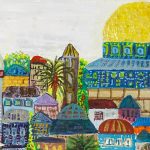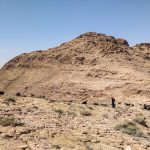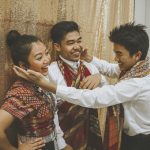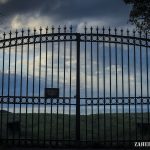Golden hour in Amman, Jordan, in the area where Rania and Basel live. Photo by Scott Lashinsky.
STORY BY HEATHER M. SURLS
The day of Donald Trump’s inauguration, Rania Walid Alyousef checked her social media feeds often. The wife and mother of three, who has lived in Amman, Jordan, since 2013, was apprehensive.
Last year, she and her husband, Mohammed Basim Alkurdi, known as Basel, had connected with a group of Americans willing to sponsor their family’s resettlement through Welcome Corps, a private sponsorship program. The family’s and their sponsors’ applications were progressing, and the family’s move to the U.S. seemed within reach.
But after Trump’s November reelection, Rania recognized that renewed travel bans and cuts to immigration were possible, given the way Trump halved refugee admissions in 2017. So when news of the president’s executive order halting refugee programs came across her screen, she was upset and saddened but not surprised.
Some Syrian refugees in Jordan with more advanced refugee immigration cases already had plane tickets to emigrate to the U.S. in February. They had sold their furniture, quit their jobs, and moved in with relatives in preparation for their scheduled departures. Now these families are stuck, unsure whether legal channels for refugee resettlement will reopen.
“[Trump] stopped the lives of people who want to move forward,” Rania said.
They had sold their furniture, quit their jobs, and moved in with relatives in preparation for their scheduled departures. Now these families are stuck, unsure whether legal channels for refugee resettlement will reopen.

Screenshot of Welcome Corps Homepage.
This U.S. executive order was not the first hurdle thrown at the Syrian refugee community in recent months. Already, the estimated 1.3 million Syrians who live in Jordan as a result of their country’s civil war felt strangled by annual work permit fees that skyrocketed to at least 500 Jordanian dinars, about $705, on Jan. 1. Previously, work permits for Syrians cost 50 dinars per year. Many didn’t know how they would pay this exorbitant fee, which was first announced late last year and is equivalent to two or more months of rent.
But then on Dec. 9, the Middle East awoke to shocking headlines proclaiming the collapse of Syrian President Bashar al-Assad’s regime, toppled by an alliance led by the prominent rebel group Hayat Tahrir al-Sham. Almost immediately, Syrian households across Jordan began to discuss the possibility of return to their country, since Assad’s ruthless rule was the reason they had fled.
By mid-January, Jordanian media reported that 17,200 Syrians had already returned from Jordan, despite the lack of basic services like electricity and water in Syria and general instability as the country shakily reestablishes itself.
Though many Syrians are cautiously optimistic about interim president Ahmed al-Sharaa’s leadership, Rania and Basel fear returning to their homeland because of ethnic discrimination. Basel and the couple’s three children have the last name “Alkurdi,” which clearly reflects Basel’s Kurdish roots. Though he and his parents never lived in northeastern Syria—an area still controlled by the Kurds, who want to establish an independent country there—Basel’s father was imprisoned under Assad’s regime because of his ancestry.

Map of the Syrian civil war. Photo provided by Wiki Commons.
A WELCOMING MIDWEST COMMUNITY
In Grand Island, Nebraska, a city of about 50,000, Julie Gustafson also followed Trump’s directives after his inauguration. Through a chain of mutual contacts, she, her husband, and four others from their evangelical church of about 500 attendees had chosen to sponsor Basel and Rania’s family. The Syrians and Americans met on Zoom last spring. With the help of an Arabic-speaking American couple, they got acquainted while working on their Welcome Corps application.
“They’re just a regular family that has had to deal with instability and upheaval simply because of where they were geographically at a certain point in time,” Julie said. “Any of us could find ourselves in desperate situations, and we would hope to find people willing to welcome us somewhere new and help us thrive.”

Julie’s Welcome Corps private sponsor group in Grand Island. Julie is seated far right.
In spite of the incoming U.S. president’s first-term record, the Grand Island group felt glimmers of optimism on Dec. 11 when their sponsorship application was approved. Through a GoFundMe page and generous contributions from their church, they’d already raised the funds needed to get the Syrians to Nebraska. Welcome Corps requires sponsor groups to cover the resettlement funds that the U.S. government normally covers for refugees’ first 90 days in the U.S. On Jan. 12, Rania and Basel had their first immigration interview in Jordan.
When Julie read the executive order, though, her hopes were dashed. Effective Jan. 27, the directive suspended “the USRAP until such time as the further entry into the United States of refugees aligns with the interests of the United States.”
“That just gutted me,” she said. “There’s things that are so much higher and more important than our own best interests.”
World Relief, a prominent American resettlement agency, responded to the executive order with a statement that resonates with Julie’s Christian convictions. “We are committed to upholding the dignity of every human life, as made in the image of God,” the statement begins. It continues: “Throughout Scripture, we repeatedly see God’s heart for the vulnerable and displaced. … As followers of Christ, we are called to reflect His love and mercy through our actions and policies.”
Today, a photo of Rania, Basel, and their children hangs on the Gustafsons’ refrigerator. The picture, along with Julie’s work with ESL classes at the local community college, keeps the Syrian family on Julie’s mind.
“As I register students for ESL classes, I’m always imagining … how great it would be to bring Basel and Rania in here and get them signed up as students and see them come in every day.”
There’s things that are so much higher and more important than our own best interests.
THE UPHEAVAL OF REVOLUTION
Rania and Basel met while studying law in Damascus. They fell in love and married as university juniors in 2008—a countercultural union in a society where arranged marriages are common and men usually wait to marry until they have stable careers. Before graduation, Rania gave birth to their son, Yazin. She recalls her female classmates’ jealousy as she graduated a wife and a mother, seventh in her class.
For a short time after graduation, Basel worked at his father’s car dealership while Rania pursued a law internship. In 2010, Basel began his compulsory, two-year military service. Then, in spring 2011, revolution swept Syria. Assad’s forces brutally cracked down on demonstrations demanding freedom. As the country plunged into civil war, the couple’s neighborhood was overwhelmed by opposition forces. Since Basel was a soldier in Assad’s army, Rania and Yazin moved for their safety to an apartment rented with her parents.
Rania remembers crossing a street that separated regime and rebel-held areas. Several-hour truces were declared to allow residents to collect belongings from their homes. Rania and several others gripped each other’s hands to cross, some whispering verses from the Quran. Once, a sniper shot a pregnant woman in the group, suspecting that she carried explosives under her clothes.
“That was the first time I saw someone die in front of me,” Rania said.
On Rania’s final trip to her home, she heard someone banging on doors in her apartment building. Through the peephole, she saw an armed teenager attempting to break down doors. She knew that if he found her unexpectedly, he’d shoot her—or worse. She tried to make her presence known by shattering vases and pushing couches across the tile floor.
After hearing her racket, the young man fled. Rania silently waited for 10 minutes—and then heard a knock on her door. A glance through the peephole revealed a group of six or seven masked and armed men at her doorway. They demanded she identify herself or they’d shoot the lock off. Sobbing in terror, Rania told them she was the apartment’s resident and begged them to let her go.
“I returned [to my family] and my tongue was tied,” Rania said, noting that in her fear, she neglected to bring the family photos Basel had requested. “I couldn’t speak. And if I tried to talk, I was like a mute. I stayed that way a day and a half.”
That was the first time I saw someone
die in front of me.
After the revolution began, government troops were stationed at checkpoints all over the country, Basel among them. Though he was supposed to remain aloof toward civilians, Rania says Basel showed kindness to those passing his station, listening to them sympathetically.
Basel’s unit was also deployed on raids to locate and arrest “terrorists”—the regime’s label for those supportive of the opposition. Though fellow soldiers encouraged Basel to at least shoot bullets in the air so his commanding officers would know he’d used his weapon, Basel refused.
“If I shoot in the air, the bullet will come back down and it might hit someone,” he reasoned.

Damascus checkpoint, Jan. 14, 2012. Photo provided by Wiki Commons.
After one of his friends defected from the army, Basel’s commanders called Basel in. He was detained and interrogated for two weeks. “You can’t sympathize with people!” the officers shouted at him. ”You’re going to defect like your friend!” They wedged him into a car tire—head toward toes—and beat his back to provoke a confession. Basel still suffers back pain because of those beatings.
At the end of his compulsory service, Basel was transferred to the reserves. After three months, he paid the conventional bribe to get a vacation and never went back. He spent a month and a half in hiding, receiving calls from members of the opposition, urging him to join them. Basel refused.
“Fleeing was the only solution for a person who wanted to live in peace, who didn’t want blood, who loved people, who didn’t want to hurt others,” Rania explained. “If you stayed in Damascus, you’d have to be with one side or the other. That or live in fear and terror.”
Fleeing was the only solution for a person who wanted to live in peace, who didn’t want blood, who loved people, who didn’t want to hurt others.
TWELVE YEARS OF DISPLACEMENT
In May 2013, Rania, Basel, and Yazin traveled to Jordan by taxi, a risky journey that took them through regime and rebel checkpoints. After crossing into Jordan, they were registered as refugees in the Za’atari refugee camp near the Jordanian-Syrian border before going to Irbid, where they stayed with a former neighbor. After a month, they continued to Amman.
They rented an apartment in Sahab, a southern region of Amman known for factories and industry. Rania says she felt shackled there. At night, gunshots rang out—Rania suspects fire between smugglers and police—making her feel like she hadn’t left Syria. Though in Damascus she’d worn short sleeves and hadn’t covered her head in public, she began to wear the hijab to protect herself from harassment.
In Sahab, Rania purchased necessities at a shop that accepted her monthly coupons from UNHCR. Twice, the man working at the cash register allowed her to take more than her coupon’s value. He began to call her, saying he’d bring the family anything they needed. Then he began to make romantic advances, paired with threats. “You’re Syrians,” he taunted, “you don’t have anyone here.” He threatened to harm Basel if she didn’t go out for coffee with him. The man even staggered to Rania and Basel’s door one night, drunk and shouting. To protect themselves, the family moved to central Amman before Omar’s birth in 2015.
They have lived in that apartment ever since, adding their daughter, Selene, in 2018. Over the years, Basel has worked a variety of jobs to support his family: in factories, in a school, as a building caretaker, and as a construction worker. A few years ago, Rania started to supplement his income by babysitting for foreigners. Aid from UNHCR has progressively dwindled to nothing.
More than once, the couple tried to find a way to emigrate. They pressed UNHCR to move on their file. They contacted embassies in Amman to inquire about opportunities. In their desperation, they once paid $500 to a man who promised he’d get Basel accepted to a university in Europe. It was a scam.

Map provided by Wiki Commons.
Life now, as a refugee, feels like being in a boat surrounded by tossing waves, fearing you might drown.
“To us, America is rescue,” Rania said.

Za’atari refugee camp in Jordan, February/March 2016. Photo provided by Wiki Commons.
Though Syria and Jordan share the Arabic language and many cultural practices, Rania often feels lonely, marginalized, and exploited. Though she and Basel have college degrees, they can’t legally work in their field. Lacking citizenship means living without dignity or rights, she said, and enduring insults, slurs, and abuse.
“I feel humiliated, I feel degraded, I feel I’m not a person,” she said of her experience of long-term displacement.
Though two of her children were born in Jordan, they too experience discrimination. Before transferring to a private school, Yazin faced racist comments and bullying from some of his classmates and teachers. An avid soccer player, he’s been denied membership at sports clubs because he’s Syrian. At one point, the teen started to say he was Jordanian just to make his way.
“He feels like he doesn’t have an identity,” Rania said.
Unable to travel outside of Jordan, Rania and Basel’s contact with family has been limited. When Basel’s father died in Syria a couple years ago, Basel wasn’t able to be by his side. When a massive earthquake rocked southern Turkey in 2023, Rania’s two brothers who’d taken refuge there were impacted. One went missing for weeks, trapped under the rubble and eventually found by family in a hospital with a head injury.
Rania’s parents did secure permission to visit Jordan for one month in summer 2024. After 11 years, Rania found them changed: her father thin, her mother unable to walk far without complaining of knee pain. Both parents revealed that they’d been arrested and interrogated by the regime in 2015. Her father was beaten even though he had served in Assad’s army his entire career.
When the regime fell in December, Rania said it was like a dream—a new life for her country, a new birth. Along with Syrians worldwide, she and Basel rejoiced as thousands of political prisoners emerged from prisons and reunited with their families.
Rania finally received news of her own brother, who’d been imprisoned in 2015. Four months after his arrest, he died, probably from torture, en route to Sednaya, the notorious human slaughterhouse in Damascus.
Though [they] have college degrees, they can’t legally work in their field. Lacking citizenship means living without dignity or rights, she said, and enduring insults, slurs, and abuse.
“NOT THE END OF THE STORY”
A globally-minded woman who taught English in Brazil before settling in Nebraska, Julie had long been interested in refugee resettlement but wasn’t sure how she could help. In September 2023, she joined a webinar to learn more about privately sponsoring a refugee family through Welcome Corps.
“Like most people, I read the news, and you hear tragic things happening all over, all the time, but you really feel powerless to do anything,” Julie said. “So to me, Welcome Corps was the chance … We can actually do something here.”
She also saw an opportunity to get fellow church members engaged, and she found them eager to support and receive Rania and Basel’s family. Trump’s executive order mentions exceptions being made on a case-by-case basis to allow some refugees to enter despite USRAP’s suspension, so Julie is educating those same people about how they can advocate for this Syrian family.
In a webinar on January 22, Welcome.US, the nonprofit managing the Welcome Corps program, recommended that sponsors be “the squeaky wheel” as they advocate for their newcomers. Julie plans to do just that. She’s already contacted her representatives about Rania’s family. By mid-February, she had submitted an inquiry about the Syrians’ case to Nebraska Congressman Adrian Smith’s office. An aide informed her that nothing can be done at this time: Funding freezes mean there are no USRAP employees to process inquiries.
We are committed to upholding the dignity of every human life, as made in the image of God…
Julie frames URSAP’s pause not as the end of their sponsorship story, but as an opportunity to engage more people and raise awareness about the differences between refugee resettlement and illegal immigration.
“I want to advocate for their specific case and ask for an exception to be made for them, and I will work on that, but also we need to show that we support the refugee program in general,” Julie said.
In the midst of advocacy, Julie continues to dream. She imagines introducing Rania and Basel to Nebraska’s flat farmland and extreme seasons, to Cornhusker football and the bimonthly tornado siren test, to Grand Island’s playgrounds and library. Last summer she met an older Syrian couple who’d emigrated to Nebraska after decades in Venezuela—maybe she’ll introduce them to Basel, Rania, and their kids.
On the other side of the world, Rania envisions a future for her children, one where Yazin might study dentistry or nursing and have access to employment in his field. She and Basel would like to work jobs that serve others. They don’t just want to sit and receive aid, she emphasizes, but imagine themselves as contributing members of American society. Life now, as a refugee, feels like being in a boat surrounded by tossing waves, fearing you might drown.
“To us, America is rescue,” Rania said. “We want to get to the safe shore.”
They’re just a regular family that has had to deal with instability and upheaval simply because of where they were geographically at a certain point in time. Any of us could find ourselves in desperate situations, and we would hope to find people willing to welcome us somewhere new and help us thrive.
In addition to serving as Anthrow Circus's assistant editor and proofreader, Heather Surls regularly contributes stories to the site, drawing inspiration from her relationships and experiences in Amman, Jordan. Her reporting and creative work have also appeared in places like Religion News Service, Christianity Today, Hidden Compass,Catamaran, Brevity, River Teeth, and Nowhere. Her first book, a memoir-in-essays about a decade in the Middle East, releases from Lucid Books in Summer 2025.









